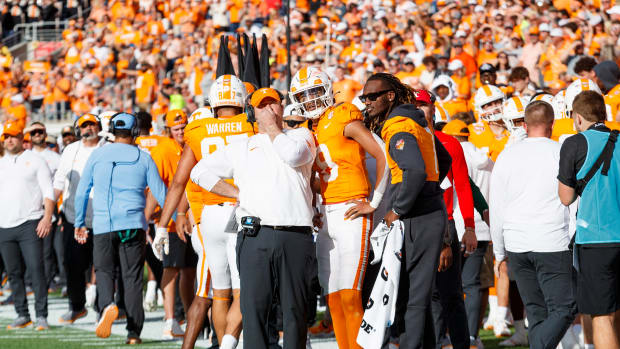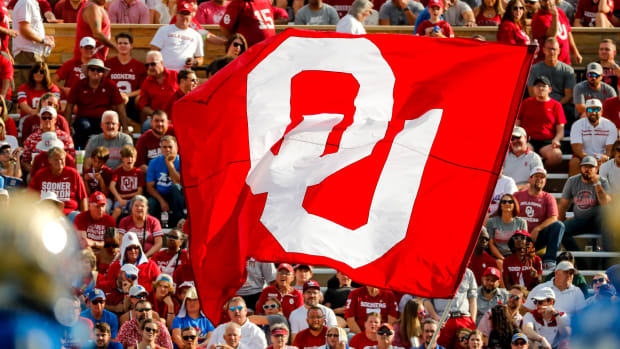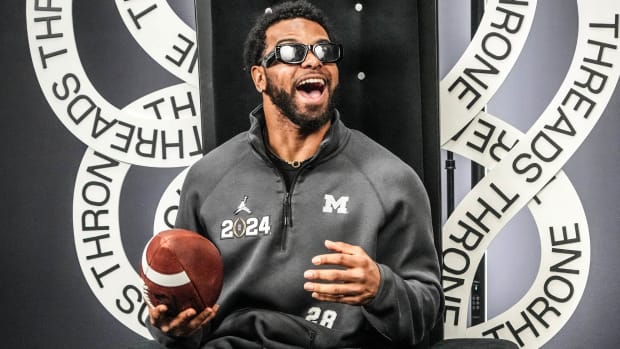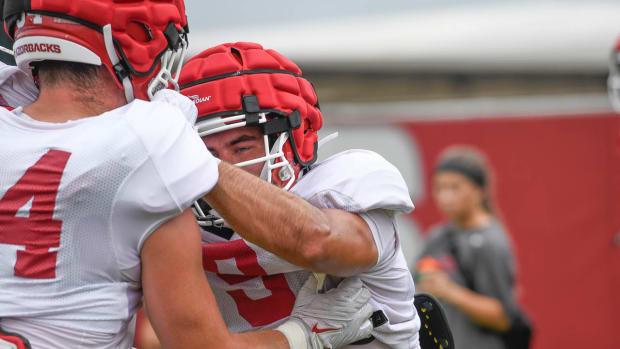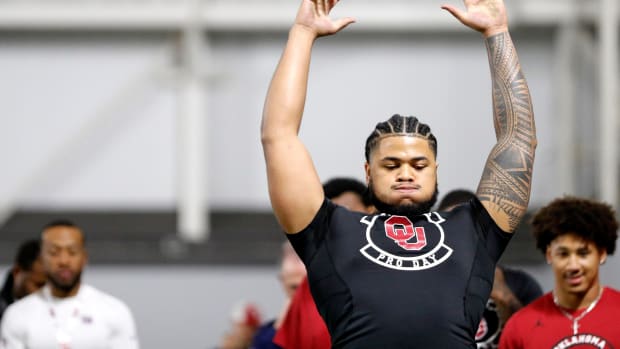The End of the Baylor Moment: How a school intent on national prominence found itself marred in shame
[video: 13724890]
This article appears in the June 6, 2016 issue of Sports Illustrated. Subscribe to the magazine here.
The breakage in Waco, Texas, is so total these days—sexual-assault victims forever scarred, football coach Art Briles fired, school president Ken Starr stripped of his post, alums and faculty and students steeped in yet another humiliating crisis—that it seems cruel to recall that there had once been a Baylor Moment. A time when the Baptist university won big and tried to behave, well, Christian. And though you could sense, even then, a lean toward the ethical edge, all in charge seemed ballasted by a healthy dose of fear.
Lord, they had reason. Baylor's 1986 and '94 bids at building a top-tier sports program resulted in NCAA probation. The 2003 murder of Baylor basketball player Patrick Dennehy by teammate Carlton Dotson revealed a program so morally bankrupt that its mere mention ended any national discussion about corruption in college sports. Indeed, by the time Baylor's moment came in early 2012—the fruition of a $600 million, decade-long plan to become a first-class academic and athletic force, and faith-based—the idea of such a mission had become almost laughable anywhere else.
After all, two stalwarts of the "We Do It the Right Way" ideal—North Carolina and Penn State—were suffering through corrosive academic and child-molestation scandals, respectively, that linger today. Still, Baylor's president insisted that he was paying heed.
"We have to be increasingly vigilant—and I'm speaking for myself," Starr said in January 2012. "It should be scary to all of us. It does show the paramount national focus on sports, that front-porch dimension, so if something bad has happened on the front porch, everyone will know about it. So it is this intense vigilance. We are continually focusing on risk-management, and obviously athletics is one of those areas that you just have to be extremely conscious of and focused on.
TRACY: An open letter to the Baylor Board of Regents from a rape survivor
"Having said that, I have great confidence in Ian McCaw, our AD, who cares deeply about doing it the right way. But I've got to do my job, and not just worry about fund-raising or alumni relations and peace among the faculty and interacting with the student body. I do need to be focused on what's happened with respect to this highly regulated arena of college athletics."
Starr's words came amid a distracting 11-week patch from November 2011 to January '12, during which quarterback Robert Griffin III won the Heisman Trophy; the athletic program polished off its best cumulative semester in the classroom up to that point (3.17 GPA); and the football and men's and women's basketball teams combined to go 40–0. Everyone on campus was giddy; McCaw told the faithful that Baylor's role "was to glorify God through athletics." And considering the pillar of rectitude in charge, a former judge who'd investigated President Bill Clinton in the '90s, nobody thought the good feeling could fade anytime soon.
"We have to be increasingly vigilant—and I'm speaking for myself," Starr said in 2012. "It should be scary to all of us."
The afterglow lasted three months. On April 11, eight days after the undefeated women's basketball team won the national championship, both the men's and women's hoops programs were hit with three years of probation for recruiting violations. Four days later Baylor defensive end Tevin Elliott sexually assaulted a Baylor freshman, Jasmin Hernandez. (In 2014, after a trial at which two other women testified that he assaulted them too, Elliott was convicted and sentenced to 20 years in prison.)
Since Baylor had no Title IX coordinator at the time, sexual assault cases were handled by chief judicial officer Bethany McCraw. According to a negligence lawsuit filed against Baylor by Hernandez in federal court in March, McCraw told a student alleging a previous assault by Elliott that the school could do nothing unless the court convicted him. The suit also alleged that two days after Hernandez's assault, her mother asked the university's counseling center if they could see her daughter. The center, according to the suit, said it was too busy. The suit also charges that the victim's parents sought to inform Briles of the attack and he never returned their calls. ("We provide interim remedies to support students who report sexual assault during the investigation and take immediate disciplinary action against students who are found responsible for acts of interpersonal violence," Baylor said in a statement.)
Duane A. Laverty/AP
Such callousness was part of a pattern, according to the devastating report released on May 26 by the Philadelphia law firm Pepper Hamilton. In a 13-page summary of its independent, Baylor-commissioned inquiry, Pepper Hamilton outlined "failures at every level of Baylor's administration"; a variation of the word fail is used 22 times in the first five pages. Despite a Department of Education warning letter to all schools in 2011 and the federal reauthorization of The Violence Against Women Act in 2013, Pepper Hamilton found repeated instances—from 2012 to '15—of "actions by University administrators that directly discouraged complainants from reporting" crimes, and "in one instance, those actions constituted retaliation against a complainant for reporting sexual assault."
In that time, at least four Baylor players were involved in violent acts against women. Defensive end Shawn Oakman was accused of assaulting his girlfriend in 2013. In April the school's all-time sacks leader was arrested for sexual assault, in Waco. (No charges were filed in the first case; he is out on bond in the second.) In June 2013 defensive end Sam Ukwuachu transferred to Baylor after he had been kicked off the team at Boise State for a violation of team rules. After Ukwuachu was accused of sexually assaulting a freshman soccer player at Baylor in October 2013, a Baylor investigation didn't find enough evidence "to move forward," according to McCraw's testimony at trial. At the same trial, his girlfriend from Boise also testified that he had struck and choked her. In August 2015, Ukwuachu was convicted of second degree sexual assault and sentenced to 180 days in jail, 10 years of probation and 400 hours of community service.
STAPLES: Why Baylor should study Arkansas's post-Petrino revival
Starr called the Ukwuachu case an "unspeakable tragedy." Pepper Hamilton described Baylor's troubles differently, criticizing the school and its football staffers for "victim-blaming," and the overriding sense that winning was more important than justice. "Leadership challenges and communications issues hindered enforcement of rules and policies," the report reads, "and created a cultural perception that football was above the rules."
And there—once again—it is: the problem everyone sees on campus after campus but nobody is able to stop. Looking back on the Baylor Moment, it seems odd to realize that today's villain was the only one who sensed the unholy mess that the school had gotten itself into. One morning in early 2012, Briles nodded in the direction of the Brazos River, where a $250 million stadium would rise with 45,000 seats to fill. "The most attractive collegiate stadium in America," he predicted. "To stay at this level that's what you got to do. Because college football today? It's an arm's race."
Last week Richard Willis, chair of Baylor's board of regents, expressed the requisite shock and outrage over the crimes and the administration's culpability, but said nothing about the warping ambition that led to both. So Starr lost his good name and his presidency, if not his chancellorship. So McCaw was suspended. So Briles was justifiably fired, but soon another coach will come and say the right things about grades and glorifying God and winning clean. There will be vigilance. Ruin awaits.


